Abstract
Because severe constipation is a disorder largely confined to young women, the possibility that menstrually related factors contribute to disturbed gastrointestinal motor function has been raised. It has also been reported that normal menstruating women show changes in upper gut transit between the follicular and luteal phases of the menstrual cycle and that patients with constipation show prolonged transit. We therefore studied relationships between symptom severity and orocaecal transit during the menstrual cycle in a group of 14 constipated women and a series of control groups comprising seven normal menstruating women, five postmenopausal women, and eight normal men, to determine whether phases of the menstrual cycle were associated with alteration in symptoms or transit. A regular menstrual cycle was reported by 13 of the 14 patients (range 26-30 days) and by all the menstruating female volunteers. Seven patients noted variation in constipation during the menstrual cycle, in all cases this comprised an improvement in symptoms just before or during menstruation. No consistent relationship between symptom severity and follicular or luteal phase was noted. Repeated orocaecal transit measurements in the four study groups showed no consistent differences (greater than 0.05) between groups or during the menstrual cycle (mean change weeks 1-4, -10 +/- 20 min). These findings are inconsistent with the hypothesis of a progesterone related effect upon orocaecal transit in either normal or constipated women.
Full text
PDF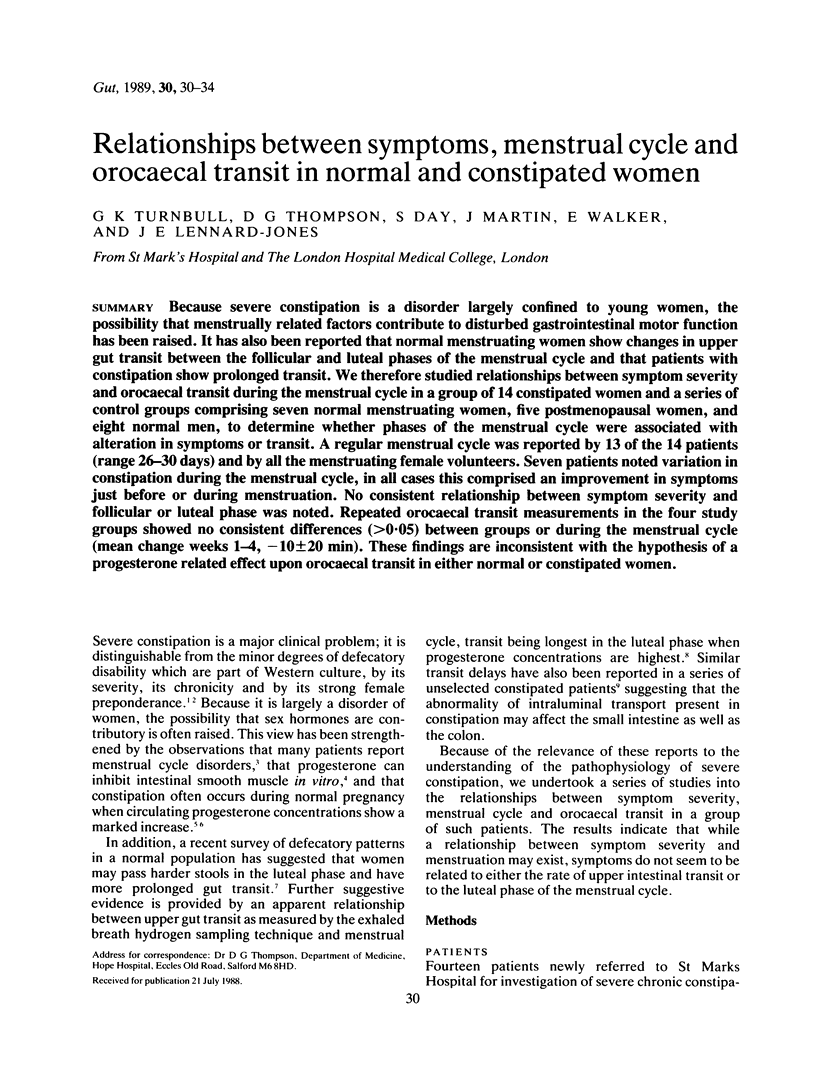
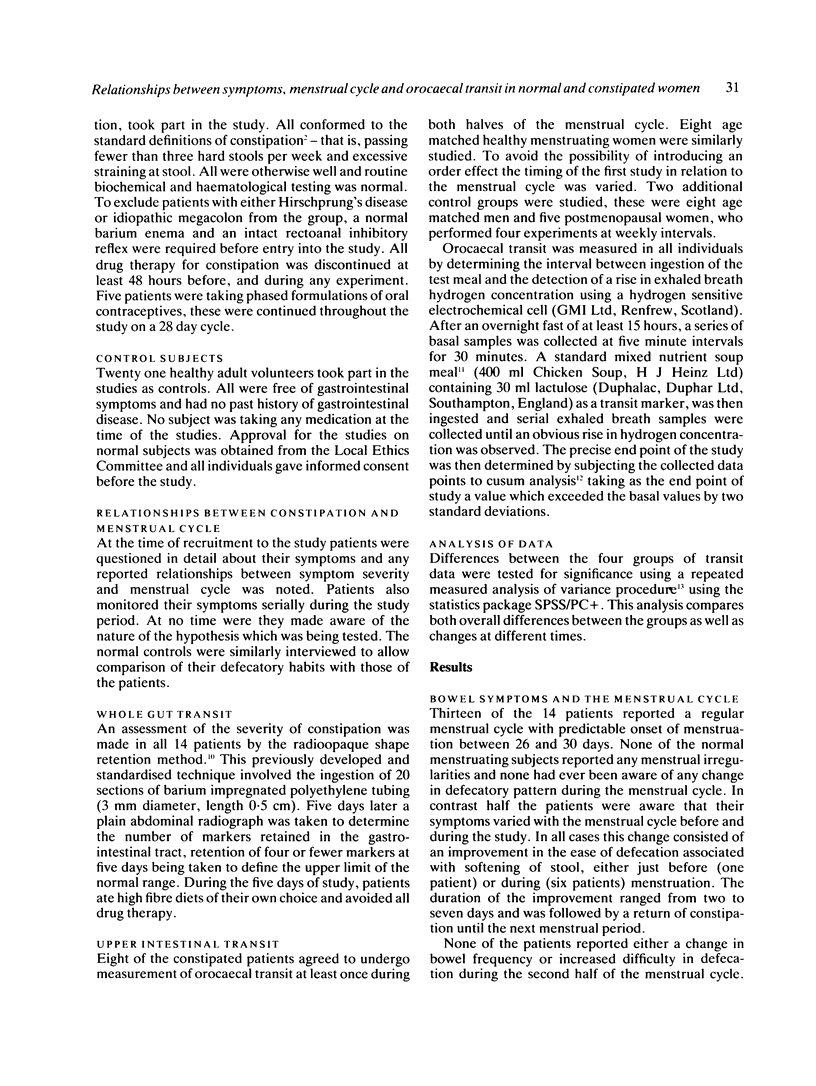
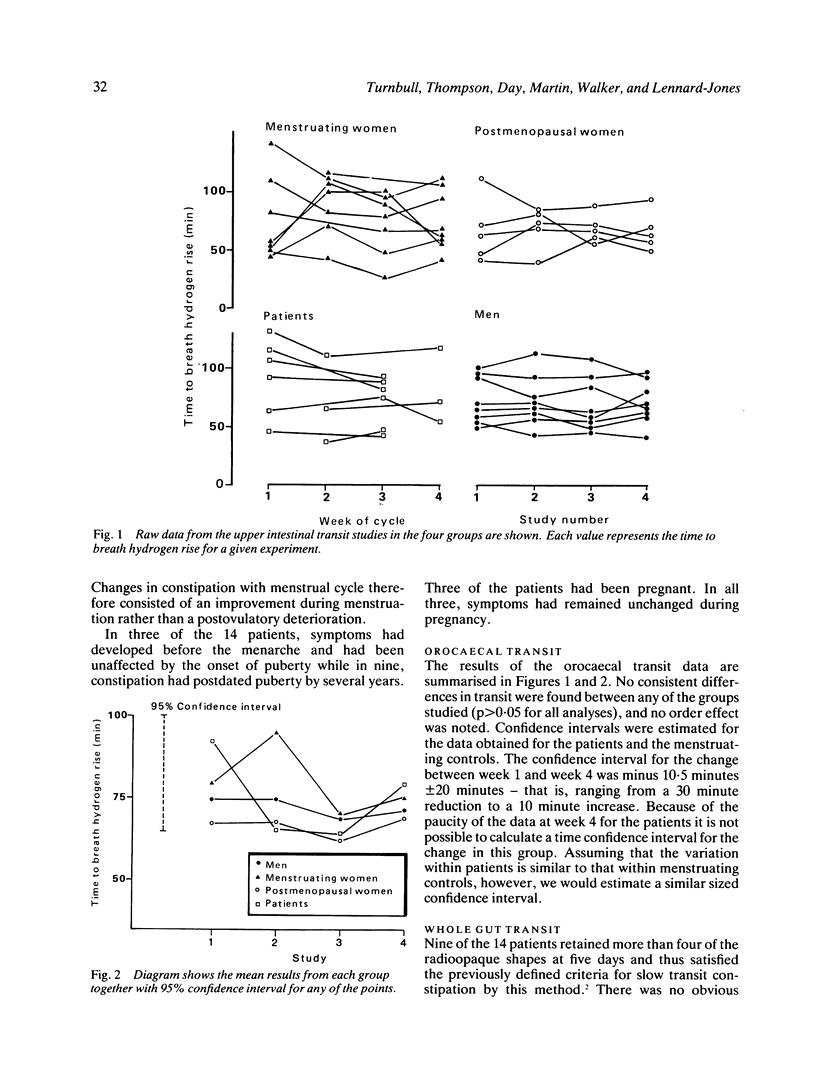
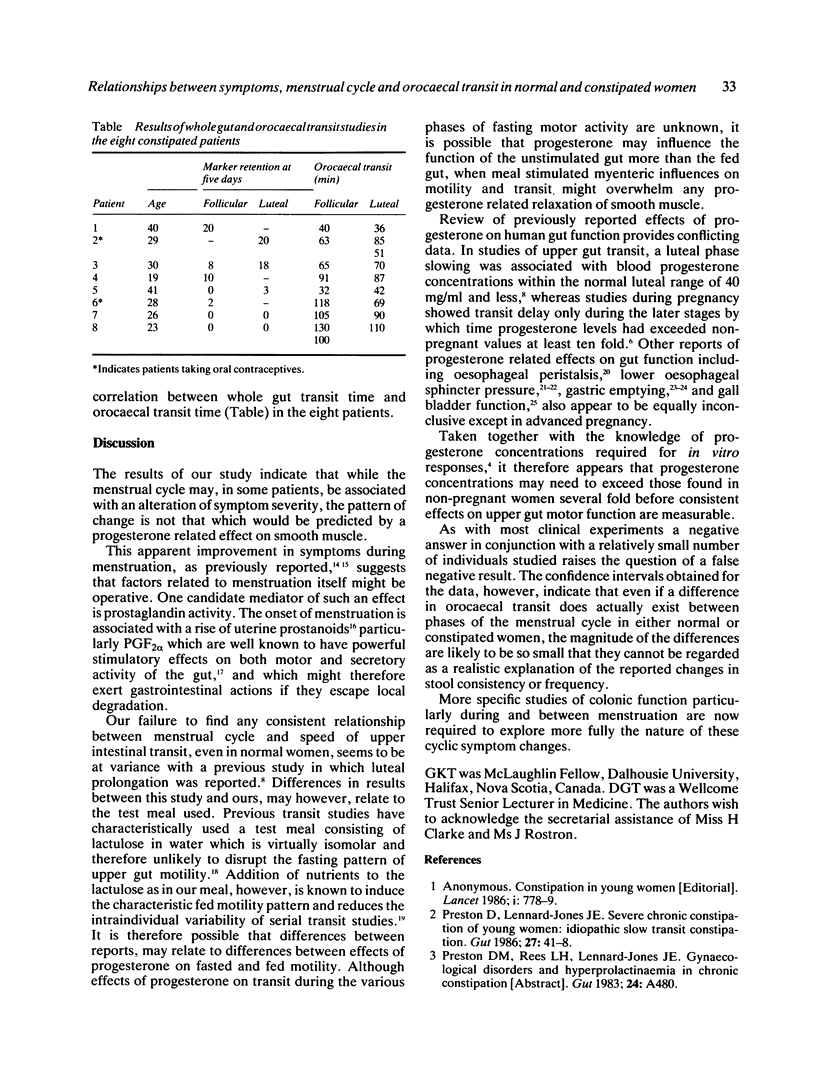
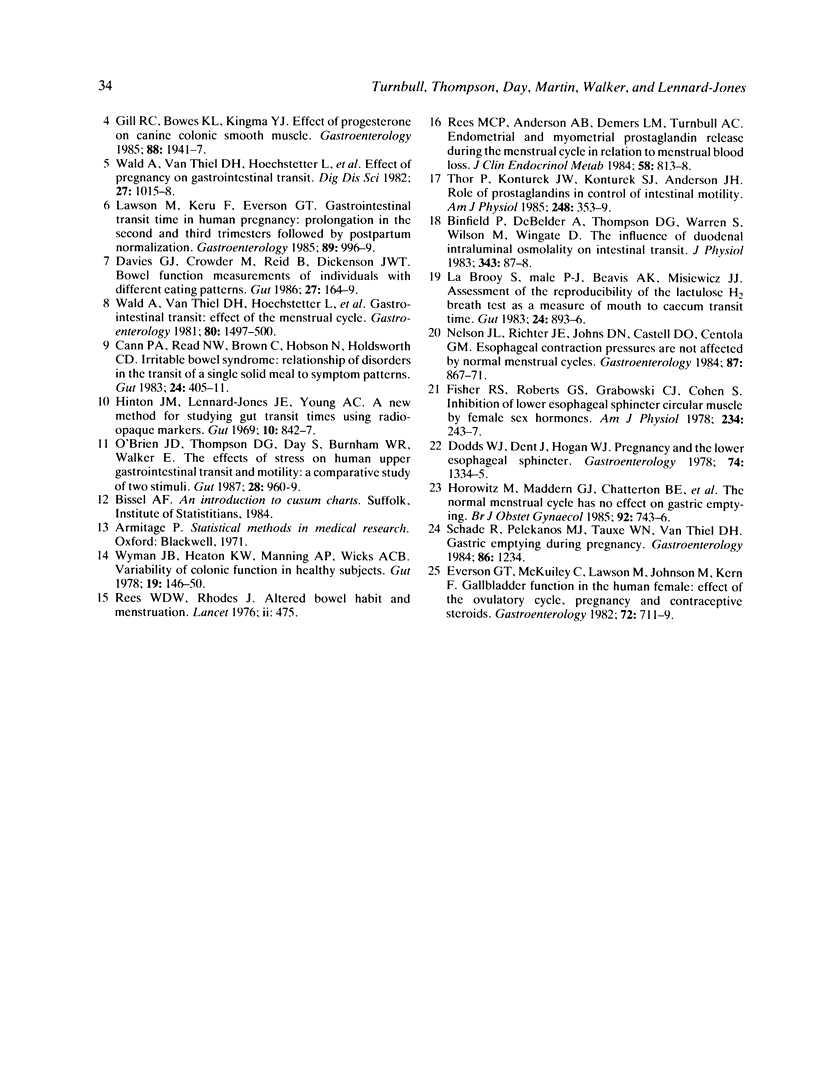
Selected References
These references are in PubMed. This may not be the complete list of references from this article.
- Cann P. A., Read N. W., Brown C., Hobson N., Holdsworth C. D. Irritable bowel syndrome: relationship of disorders in the transit of a single solid meal to symptom patterns. Gut. 1983 May;24(5):405–411. doi: 10.1136/gut.24.5.405. [DOI] [PMC free article] [PubMed] [Google Scholar]
- Davies G. J., Crowder M., Reid B., Dickerson J. W. Bowel function measurements of individuals with different eating patterns. Gut. 1986 Feb;27(2):164–169. doi: 10.1136/gut.27.2.164. [DOI] [PMC free article] [PubMed] [Google Scholar]
- Dodds W. J., Dent J., Hogan W. J. Pregnancy and the lower esophageal sphincter. Gastroenterology. 1978 Jun;74(6):1334–1336. [PubMed] [Google Scholar]
- Everson G. T., McKinley C., Lawson M., Johnson M., Kern F., Jr Gallbladder function in the human female: effect of the ovulatory cycle, pregnancy, and contraceptive steroids. Gastroenterology. 1982 Apr;82(4):711–719. [PubMed] [Google Scholar]
- Gill R. C., Bowes K. L., Kingma Y. J. Effect of progesterone on canine colonic smooth muscle. Gastroenterology. 1985 Jun;88(6):1941–1947. doi: 10.1016/0016-5085(85)90023-x. [DOI] [PubMed] [Google Scholar]
- Hinton J. M., Lennard-Jones J. E., Young A. C. A ne method for studying gut transit times using radioopaque markers. Gut. 1969 Oct;10(10):842–847. doi: 10.1136/gut.10.10.842. [DOI] [PMC free article] [PubMed] [Google Scholar]
- Horowitz M., Maddern G. J., Chatterton B. E., Collins P. J., Petrucco O. M., Seamark R., Shearman D. J. The normal menstrual cycle has no effect on gastric emptying. Br J Obstet Gynaecol. 1985 Jul;92(7):743–746. doi: 10.1111/j.1471-0528.1985.tb01458.x. [DOI] [PubMed] [Google Scholar]
- La Brooy S. J., Male P. J., Beavis A. K., Misiewicz J. J. Assessment of the reproducibility of the lactulose H2 breath test as a measure of mouth to caecum transit time. Gut. 1983 Oct;24(10):893–896. doi: 10.1136/gut.24.10.893. [DOI] [PMC free article] [PubMed] [Google Scholar]
- Lawson M., Kern F., Jr, Everson G. T. Gastrointestinal transit time in human pregnancy: prolongation in the second and third trimesters followed by postpartum normalization. Gastroenterology. 1985 Nov;89(5):996–999. doi: 10.1016/0016-5085(85)90199-4. [DOI] [PubMed] [Google Scholar]
- Nelson J. L., 3rd, Richter J. E., Johns D. N., Castell D. O., Centola G. M. Esophageal contraction pressures are not affected by normal menstrual cycles. Gastroenterology. 1984 Oct;87(4):867–871. [PubMed] [Google Scholar]
- O'Brien J. D., Thompson D. G., Burnham W. R., Holly J., Walker E. Action of centrally mediated autonomic stimulation on human upper gastrointestinal transit: a comparative study of two stimuli. Gut. 1987 Aug;28(8):960–969. doi: 10.1136/gut.28.8.960. [DOI] [PMC free article] [PubMed] [Google Scholar]
- Preston D. M., Lennard-Jones J. E. Severe chronic constipation of young women: 'idiopathic slow transit constipation'. Gut. 1986 Jan;27(1):41–48. doi: 10.1136/gut.27.1.41. [DOI] [PMC free article] [PubMed] [Google Scholar]
- Rees M. C., Anderson A. B., Demers L. M., Turnbull A. C. Endometrial and myometrial prostaglandin release during the menstrual cycle in relation to menstrual blood loss. J Clin Endocrinol Metab. 1984 May;58(5):813–818. doi: 10.1210/jcem-58-5-813. [DOI] [PubMed] [Google Scholar]
- Rees W. D., Rhodes J. Altered bowel habit and menstruation. Lancet. 1976 Aug 28;2(7983):475–475. doi: 10.1016/s0140-6736(76)92575-7. [DOI] [PubMed] [Google Scholar]
- Wald A., Van Thiel D. H., Hoechstetter L., Gavaler J. S., Egler K. M., Verm R., Scott L., Lester R. Effect of pregnancy on gastrointestinal transit. Dig Dis Sci. 1982 Nov;27(11):1015–1018. doi: 10.1007/BF01391748. [DOI] [PubMed] [Google Scholar]
- Wald A., Van Thiel D. H., Hoechstetter L., Gavaler J. S., Egler K. M., Verm R., Scott L., Lester R. Gastrointestinal transit: the effect of the menstrual cycle. Gastroenterology. 1981 Jun;80(6):1497–1500. [PubMed] [Google Scholar]
- Wyman J. B., Heaton K. W., Manning A. P., Wicks A. C. Variability of colonic function in healthy subjects. Gut. 1978 Feb;19(2):146–150. doi: 10.1136/gut.19.2.146. [DOI] [PMC free article] [PubMed] [Google Scholar]


